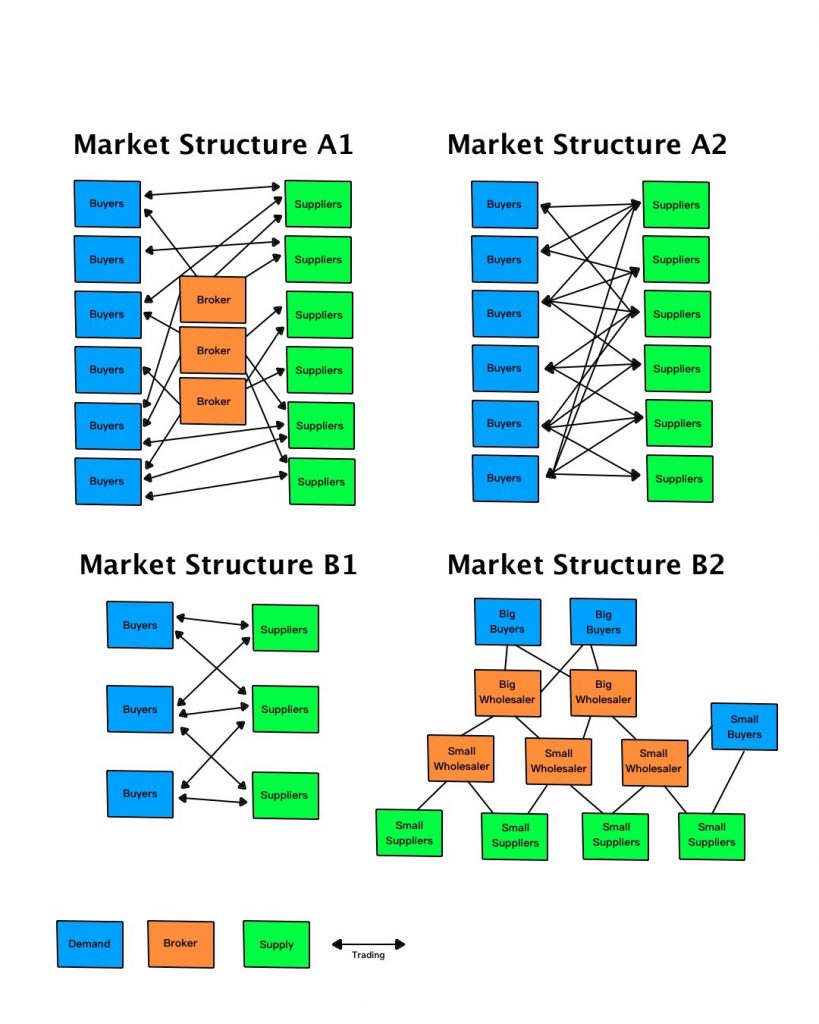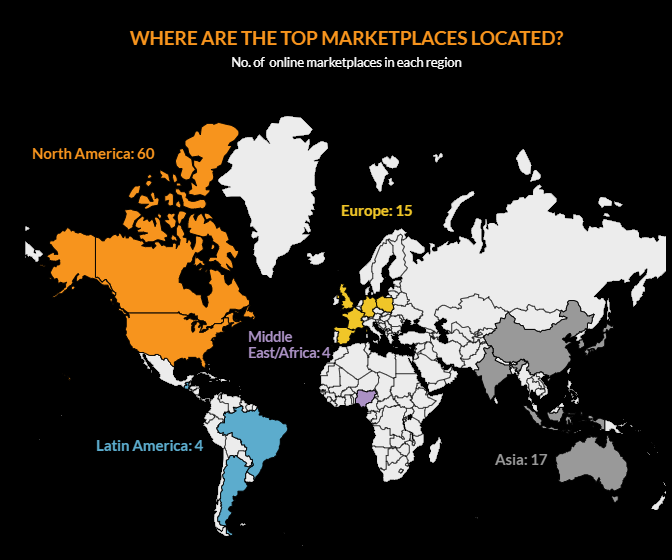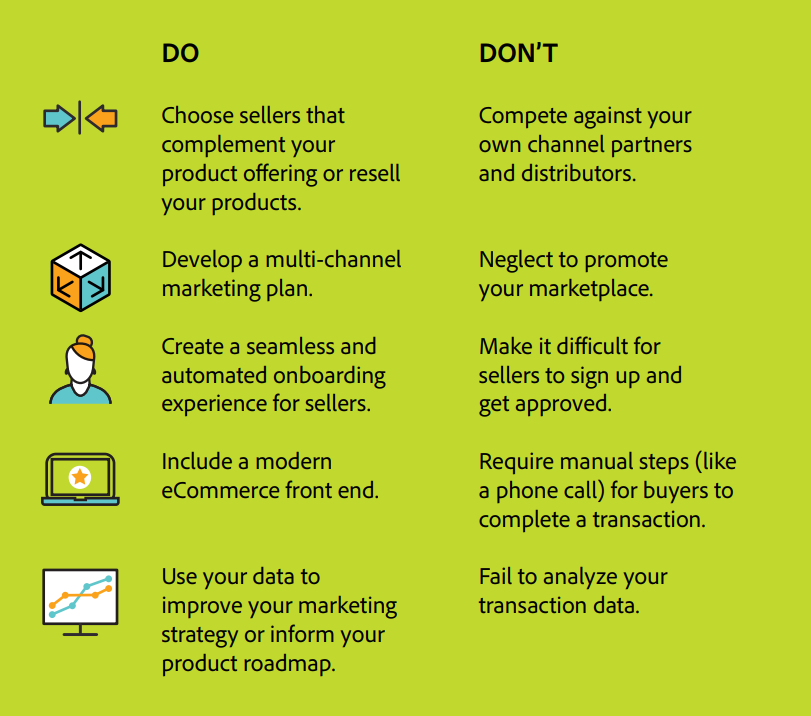Besides the intercontinental competitiveness, Magento B2B companies also have difficulty in how to reach the right potential customers in many different markets. Commercial models may cost you a fortune yet remain ineffective. As a result, a plethora of businesses are scouring the online environment for Magento B2B marketplace tools to polish their brand image in the most economical way.
Especially after the COVID-19 pandemic, doing transactions on e-commerce marketplaces becomes even more essential for businesses to survive and thrive in the digital age.
That rapid shifting trend has motivated us to provide necessary information so that you can understand the transformation of the eCommerce world today, stay ahead of your competitors and win a big pie for your business.
What is a B2B marketplace? How to build a basic marketplace? Which Magento 2 B2B marketplace extension is recommended? We will address all those inquiries in this post so you – early birds – don’t have to confront any obscurity. This can be considered as a starter guide that provides fundamental knowledge for newbies in this B2B Marketplace field.
An Overview of B2B Marketplace for Magento
Table of Contents
The Concept of B2B Marketplace
Simply speaking, a marketplace is an eCommerce site where multiple third-party vendors will upload their products and buyers will choose from them. Amazon Business and Alibaba are typical B2B examples.
In traditional B2B eCommerce, a seller operates exclusively on their own personal digital environment and delivers products to many purchasers. However, this procedure limits the sellers’ chance to reach new audience and buyers’ ability to compare the market. Therefore, to have a healthy playground for both supply and demand sides, the concept of a B2B marketplace was born.

STEAL tips in Magento B2B experience to ensure the highest satisfaction for corporate customers.
Specifically, a B2B marketplace brings together many buyers and sellers on the same website. The marketplace operator not only monitors the entire shopping community on their site but also sells their own products and services.
In a B2B marketplace, you will meet 2 distinct sales figures, namely niche players and market leaders. While the former are businesses majoring in a particular niche market or community of users, the latter have already gained a large customer base, had a lot of organic web traffic, and planned to expand their market size by offering more choices to their existing customers.
Today, following the Omni-Channel trend, various companies have leveraged B2B marketplaces to increase business coverage as well as enhance opportunities to reach new customers.
“By 2023, 15% of medium- to high-gross-merchandise-value digital commerce organizations will have deployed their own marketplaces, thereby creating an entirely new digital ecosystem.”, claimed Gartner. Moreover, they also forecasted that “at least 70% of enterprise marketplaces launched will serve B2B transactions by 2023”.
Characteristics of B2B Marketplace
- E-commerce trading floor is a service business organization, considered as an intermediary between sellers and buyers;
- Trading methods at B2B marketplaces are diverse;
- You – the admin – can set up rules for your members and apply penalties for those who violate;
- The admin has their own rules and responsibilities;
- There are a large number of buyers, vendors, and suppliers;
- Participants can be sellers, buyers, or both;
- A B2B marketplace shows the supply-demand relationship of the market;
- All purchase, sale, transaction, negotiation, and payment processes are made online on the Internet;
- Buyers and sellers can participate in transactions anytime and anywhere;
- The category of goods and services is diverse and rich, including intangible and tangible objects;
- A B2B marketplace is a place implementing information and connecting customers;
- Members participating in the B2B marketplace are entitled to exploit information about the market, products, policies, etc.
Differences between Marketplace and Normal Online Store
| Marketplace | Normal Online Store |
| Include multi-sellers | Function as a single seller |
| Ensure enough features to cover buyer-seller interaction | Sellers have to care for their store functionality themselves |
| Support B2B order processing process, payment methods, and delivery services | Sellers are in charge of everything from the first approach to shipping. |
| Generate a large number of visitors | Sellers have to perform some actions such as SEO and marketing to attract visitors |
| Trusted by customers | Sellers need to gain customer trust from scratch |
| Sellers can choose the business model and plan as wished | Sellers must keep investing in their own store to maintain their site performance |
| The sales model is diversified | The sales model is fixed |
Various Types of B2B Marketplaces
In fact, the classification of the Marketplace varies widely. Let’s take a look at the most basic and most mentioned categorizing methods.

Based on Product Types
Vertical B2B Marketplace
These offer products of the same category. They can come from tons of different distributors and manufacturers. Yet, all are products of the same type. Uber, for example, offers its users a wide variety of motorcycle services from different operators.
Horizontal B2B Marketplace
These are virtual markets that provide shoppers with a variety of products and services which share the same properties.
For example, assume a corporate customer belongs to the construction industry. Besides construction supplies and services, horizontal B2B marketplaces can also let that buyer connect with vendors of bulk furniture for their new office setup.
Global B2B Marketplace
This sells a wide range of different items and products. Highlights can be mentioned in Amazon. This website is an ecosystem that brings everyone essential products for their lives from low-end to high-end, to meet all needs and budget.
Based on the Business Model
B2B Product Marketplace
It is a mutual environment connecting businesses from many places for product supply fulfilment. For example, a garment company and an apparel supplier gather together at your marketplace.
B2B Service Marketplace
Right from the name implies that it brings together businesses providing services to each other. You will be able to witness the combination of a design service provider and a financial consulting firm.
Hybrid Marketplace
A hybrid marketplace is a complex network that involves both B2B and B2C transactions. It includes products, services, B2B, and B2C features. In other words, any marketplace offering more than one type of business model is considered a hybrid marketplace, regardless of B2B, B2C, or C2C.
For example, Urban Clap is a B2C service marketplace, while FreeLancer is a B2B service marketplace. Similarly, Amazon and Alibaba are both B2B and B2C product marketplaces. Meanwhile, eBay combines B2B, B2C, and the C2C product-based business model.
4 Structures of B2B Marketplace
For anyone planning to convert their Magento stores to a B2B marketplace and scouring the best approach, Bill Gurley’s framework will be a powerful tool for evaluating the market and helping you understand criteria that create a comprehensive marketplace.
In the B2B marketplace, the relationship between supply and demand also went hand in hand with some sort of middleman. According to Point Nine Land, these relationships are visualized to one of four specific market structures, where A1 and A2 represent the objects that are more in favor of a marketplace rather than B1 and B2.

Source: Point Nine Land
A1 – The Middleman
In this structure, both sellers and buyers are highly fragmented and connected through a lot of middlemen such as traders and agencies. Not only do these middlemen play a connecting role, but they also offer additional services such as logistics, insurance, and trade financing.
If you plan to construct a marketplace for B2B businesses, it’s wise to think of providing similar services so you can replace the middlemen and benefit from both supply and demand side.
A2 – Direct Relationships — High Fragmentation
Frankly, this is the classical market structure in favor of a B2B marketplace where stands highly fragmented supply and demand that do business together. The aggregation by the marketplace enables buyers to seek new vendors who offer better prices or high-quality products.
In addition to addressing the above discovery problem, some marketplaces of this type also deliver other services to ensure an efficient process. For the vendor side, an A2 marketplace allows them to generate more leads and increase their brand awareness.
B1 – Direct Relationships — Low Fragmentation
Compared to A2, B1 shows that at least one side is less fragmented. This means that there are fewer yet potentially stronger direct relationships between buyers and sellers.
You know, in B2B business, suppliers are prone to build long-lasting relationships with their corporate customers. Thus, if the degree of fragmentation is low, and if people are hesitant to switch providers frequently, it’s hard to break into the existing relationships. Furthermore, business relationships barely maximize profits because you – the marketplace admin – would basically extract value at the expense of the buyer or seller side.
B2 – The Pyramid
This structure is a bit more complex. In the picture above, the B2 structure looks a bit like a pyramid. At the bottom is a very fragmented long tail of small suppliers. When climbing up to the middle, you see small-to-big wholesalers that aggregate the fragmented supply side.
Although a few small buyers appear in the chart, the majority of the sales volume are brought in by a few big buyers who work with big wholesalers.
Typical Business Models in B2B Marketplace
Choosing the best-fit business model is of utmost priority so you can set the first bricks for the process of building your Magento B2B marketplace.

Commission Model
This is the most popular revenue model common in B2B marketplaces. It can also be called a transactional model since the marketplace owner earns from every transaction conducted on their site.
For instance, this model charges either the percentage-based or fixed amount commissions from sellers on every sale they make.
Thanks to the investment-less approach of this business model, vendors of a B2B marketplace don’t have to pay anything to the marketplace until a sale appears. Nevertheless, as a marketplace owner, you need to facilitate sellers to increase their sales opportunities so that you can get your share from it.
Subscription Model
When you follow the subscription model, both sellers and customers of your marketplace will be affected. While some ask sellers for a monthly subscription fee to list their products on the site, the others request a subscription fee from buyers.
In brief, the marketplaces have to bring a lot more than simply a listing space to earn from this revenue model. Make sure to provide enough value-added propositions to appeal companies to subscribe to your plan. For example, it assists sellers in finding new customers. Similarly, the customers might get blue-ribbon services like faster shipping, more discounts, and deals.
Listing Fee Model
Our third business model floats somewhere between the commission and subscription model. Every listing the sellers want to upload on your marketplace costs them a fee.
The problem here is that it’s hard to persuade sellers to pay the fee. Only when they know that their products will be visible to the eyes of a huge community of buyers are they willing to pay for the listing on your marketplace.
If your market includes suppliers of expensive products, then you should adopt this listing fee model because each transaction is of great value.
For example, Mascus is a B2B marketplace specializing in heavy machinery. Sellers here prefer per-listing plans in contrast to recurring monthly charges.
Lead Fee Model
Instead of paying for a product listing, the sellers pay to the marketplace when they have an order or generate a lead. In such marketplaces, buyers can post requirements, and sellers to bid on it.
B2B and B2C marketplaces are really keen on this business model. Typically, a lead fee model will work its magic when every lead brings a large transaction or a long-lasting relationship.
Featured List Model
It seems like an Ad-based model where you charge the vendors and help them gain better leads and sales with a featured listing.
On your B2B marketplace homepage, there are some spaces dedicated to listing prominent sellers or products besides regular organic lists. These featured listings function like ads on the platform, which raise vendors’ chance of being viewed by potential customers.
Freemium Model
If you’re a Magento B2B marketplace startup, pick the Freemium model. The main motive of this model is allowing free access to all; then, you propose paid access to specific businesses for further enhancement with value-added tools.
Outstanding B2B Marketplace Examples
Amazon
Amazon.com is an e-Commerce website originating in the US. With the original business model of selling books online, Amazon has now become the world’s leading marketplace with a variety of goods and industries ranging from books, electronics, to cosmetics or specialized machines. For sellers, owning a booth on Amazon is not only a guarantee to reach a huge number of potential customers, but also an opportunity to advertise their brand on this number one platform.

WANT MORE ALTENATIVES? Check out the ultimate list of trusted B2B eCommerce Marketplace HERE!
During the last catastrophic global epidemic COVID-19, Amazon was one of the few companies in the US that asked their employees to increase their working hours and had stock values skyrocketing.
Amazon has a relatively complete seller scoring system, which is enough to increase the appeal and reputation of their products. Buyers can upload product pictures in the review section after purchasing. Moreover, Amazon grants many policies that protect users’ interests and special offers for Amazon Prime users such as product discounts, freight priority or free shipping to retain consumers.
Pros:
- Reach diverse and rich global consumers;
- Raise brand awareness;
- Supported by Amazon’s professional team;
- Ensure a highly efficient transportation and warehouse system.
Cons:
- High cost of maintaining the store and shipping;
- Rigorous Amazon’s demands on the sellers;
- Fierce competition with other giants on theB2B marketplace.
Alibaba
All wholesalers know Alibaba – a China e-commerce channel – that is considered one of the famous global B2B marketplaces. Alibaba was born from a need when foreign businesses wanted to import goods from the Chinese market but they lacked information about domestic companies. Meanwhile, domestic firms wanted to export goods but lacked a platform to connect with foreign customers. With Alibaba, foreign businesses can search for details of products and suppliers in China.

Pros:
- Diverse and plentiful global business approach;
- Brand advertising;
- Be proactive in promoting products;
- Many options for transportation and warehouse services.
Cons:
- Lack of policies to protect sellers and businesses;
- The barriers for businesses wanting to participate are relatively high.
The Onward Trend of Shifting to Magento B2B Marketplace
Needless to say, the B2B marketplace at Magento ecosystem is getting hotter than ever. 5 out of 10 of our book live demo customers have consulted us for converting their existing Magento 2 stores to the B2B marketplace environment.
Store owners are actively switching to the Magento B2B marketplace because they want to be a pioneer compared to their competitors. Although early 2019 saw just over 11% of B2B businesses own a marketplace, eCommerce companies have quickly spotted this fertile land and acted first with the aim of becoming the leader.
Magento 2 B2B marketplace is increasingly popular, especially for wholesale manufacturers and distributors due to their delay in the adoption of new digital strategies. Interestingly, the 3-year profit growth of businesses that implemented digital strategies before was twice as much as that of companies located in safe areas.
The following statistics analyzed by Internet Retailer with the top 75 online marketplaces worldwide have proven the expansion of the marketplace in the future.

Source: Steel Kiwi

Source: DigitalCommerce360.com
Whether acting as a marketplace operator, seller, or buyer, we cannot deny the benefits that Magento B2B Marketplace brings to the participants.
- It contributes to the development of e-Commerce to become stronger and more diverse in different forms, such as B2B, B2C, C2C, etc.
- A transparent marketplace helps small businesses and retailers gain a competitive opportunity even though they didn’t stand a high chance of building and managing a separate B2B website;
- Enterprises inherit almost all of the advantages of an e-Commerce trading floor;
- Sellers access a huge set of corporate customers;
- Cutting-edge science and technology platforms are integrated;
- You can deploy professional sales and marketing strategies;
- It motivates pioneering businesses to grow and innovate for more value.
READ NOW: Top 19 On-Sale Magento B2B Marketplace Extensions – UPDATE 2022!
Benefits of Magento Multi-Vendor B2B Marketplace
Still doubt about the implementation of a Magento 2 B2B marketplace? Then absorb its benefits right away!
Build Up Your Brand Presence
By delivering a place for multi vendors and showcasing your products online, you can enlarge your chances of reaching qualified buyers and closing big deals. Also, your marketplace can operate 24/7 and 365 days per year, which makes your brand always visible in the customers’ minds.

Trust us. B2B marketplace platform will give you more opportunities to monetize every transaction done on your playground. Moving your store to a vast land facilitates you to grow your business by attracting sellers, buyers, products, and services.
You may think that building a B2B marketplace would cost you a fortune? Clear away that prejudice right away! Operating this marketplace does require some investment; however, you can enrich your business lines yet still minimize expenses on marketing actions, additional inventory, and warehouse systems.
Test the Popularity of New Items
Functioning in an open environment like a B2B marketplace, your company can easily inform sellers and buyers about your product release and development. The marketplace portals equip owners with sales-trend insights into different segments and industries to quickly grab market demands. From there, you can take early actions to launch favored products and savor the benefits of first-movers.

Stretch Your Corporate Customer Base in Different Countries
Globalization doesn’t permit you just to limit yourself in the safe zone of your country. Modern Magento B2B marketplaces support localization settings to deliver a personalized experience.
Specifically, your products and services are within reach of international corporations because the system can translate product information into different languages. There are also solutions and services available to address the complexities of global transactions and logistics.
It’s much more comfortable for wholesalers, distributors, and manufacturers to draw a wider range of audiences and mount up customer databases all over the world.
By the way, ABSORB Customer Data Management Practises NOW to smooth your business operation!
Optimize Your Support and Customer Relationships
Selling on the Internet acts as a deterrent to the interaction between sellers and buyers, while B2B transactions have to go through a negotiation process that requires much more communication than the B2C model.
Your worry would disappear when utilizing a Magento 2 B2B marketplace. It supports uprising the conversation with B2B customers, and thereby you can reinforce long-term business relationships.
A B2B marketplace will smash every fence of your current business. You will no longer be limited to a narrow pond of leads and potential customers. Instead, you can operate your B2B company in a complete ecosystem where multi vendors and engaged purchasers get together. With expanded offerings from different B2B sellers, the user experience will be dramatically improved, and your website becomes a one-stop place for customers whenever they start their buying journey.
The 24/7 functionality of a B2B marketplace enables you to support your customers timely and professionally. The faster your support service is, the higher customer satisfaction will be. Thus, it’s easier to strengthen the relationship with your customers and partners.
Diversify Sources of Your Revenue
Last but not least, besides earning from product sales, you can escalate your revenue sources when building a Magento 2 B2B marketplace. As business models mentioned above, you can generate profits from commissions, advertising fees, subscriptions, and so on. Even more, a B2B marketplace facilitates you to discover new niches and benefit from multiple sources.
What to Consider Before Building Magento 2 B2B Marketplace
Required Actions of a Basic Magento 2 B2B Marketplace
For Admin:
- Facilitate Marketplace;
- Manage Vendor;
- Mange Product vendor;
- Manage Commission;
- Manage Order;
- Manage Rating and review;
- Connect Vendor and Seller;
- Manage and Coordinate Buyer’s RFP;
- Room for Negotiation (Send message between Seller – Buyer).
For Vendor/ Seller:
- Basic permission/role to manage and facilitate his/her own micro-store;
- Create a micro-store for each vendor ;
- Create and manage Products;
- Create and Manage Orders of their own store;
- Manage Content on Micro-store (About us);
- Manage Review and Rating on their own store;
- Receive RFQ fitting to them;
- Proceed Quotes.
For Buyer:
- Submit Quote;
- Purchase products in the Marketplace;
- Support multiple store views with multiple currencies.
Trustworthy Providers of Magento 2 B2B Marketplace Extension
To convert your existing Magento 2 store to a marketplace, you should integrate your site with Magento 2 B2B Marketplace extension. Thus, before starting to plan your project, let’s do some research and evaluate famous providers of B2B marketplace modules in the industry.
We highly recommend you to read reviews from real customers about features and support policies of on-sale extensions for the best judgment.
Read the following article to know which Magento 2 multi-vendor marketplace extension matches you the most:
Marketplace Do’s and Don’ts

Source: magento.com
B2B Implementation Service for Magento 2 B2B Marketplace
Currently, there are multiple reputable web development service providers on the market to help you convert from the existing Magento store to a Magento 2 B2B marketplace without any constraint. If you are innovators and early adopters in the Magento ecosystem and are having difficulty adopting new technologies, it’s inevitable to seek third-party solutions.

With professional support, shifting to the B2B Marketplace becomes easier than ever. You may easily notice some benefits of B2B implementation for the Magento website:
- Third-party cooperation: No matter where you are in your journey, a solution provider can bring an optimal solution that progressed on profound B2B insights. Third-party services from hosting to themes need to be included in every implementation service to aid merchants stepping up firmly on the website implementation roadmap.
- High-quality products: B2B experts deliver a complete website development process with code quality adhering to Magento’s standards.
- AtoZ solution: Gone are the days of scrambling to pick up individual modules from several places that don’t work well together. With B2B Implementation service, team members will install and set up a whole B2B package and Magento 2 B2B marketplace extension for your site to ensure the highest compatibility and performance. The output will be a wholesale website functioning perfectly in every customer journey and sales strategy.
- Long-term partnership: Your site launching doesn’t mean the website implementation process would halt. A trusted provider will ensure your site operates at its best without issues and security vulnerabilities.
How to Build a B2B Marketplace Based on Magento Platform
Step 1: Analyze and Define B2B Marketplace Requirements
Regardless of your company size, you must totally comprehend the requirements of the industry you intend to build your Magento 2 B2B marketplace on. Moreover, remember to identify products/ services, sellers, and buyers on your market to stick on the right road.
You can consult or invite your loyal customer network to accompany you into your marketplace construction. They may be able to give you insights to meet the market needs. Only when you clarify these requirements and development direction should you dig into further solutions.
Step 2: Assign a Team to Your Marketplace Project
Human resources are always a precious asset for any project. Building a Magento 2 B2B marketplace requires a devoted team of experts who transform your initial requirements into reality. Some key members listed here are project managers, certified developers, business analysts, and UX/UI designers.
Besides your in-house team roles, it’s wise to reach out to trusted web development agencies to know customization costs and measure your proper investment.
Once finishing the comparison, choose a suitable provider and kick off your B2B marketplace construction. To be more specific, you can calculate the cost of building a B2B marketplace by multiplying the total hours the development team spent on the project with the hourly rates.
Step 3: Pay Attention to B2B Features
Since your original operating platform is Magento, make sure your website is fully B2B enabled. Check whether you have all the indispensable capabilities such as access restriction, B2B registration, company account management, pricing tools, product presentation, checkout optimization, and order fulfillment.
VISIT Magento 2 B2B features to comprehend which one you should add to your store.
In case your Magento 2 store still lacks some important features, we highly recommend you to consult a reputable Magento 2 B2B eCommerce Solution to carry off your shortages.
Step 4: Include Core Features of a B2B Marketplace
REGISTRATION & ACCOUNT MANAGEMENT
First of all, the Magento default doesn’t fully support the B2B registration process. When moving your store to the marketplace, you must ensure to offer a convenient sign-up form that encourages customers to take desired actions with your business.
PRODUCT LISTING CREATION
Now, you aren’t the only one who can post products on site. A must-have feature of the Magento 2 B2B marketplace is to grant sellers the ability to upload and manage their listings. To prevent the scam situation, you can enhance the platform security by forcing sellers to go through a brief verification before creating product listings.
SEARCH OPTIMIZATION
Because B2B marketplaces contain a surfeit of product supplies, the searching feature should be optimized to fasten the exploration stage of buyers. For example, filters and sorting help users narrow down their search.
CHATBOX SECTION
Two-way communication is a must in the supply-demand relationship; therefore, a good Magento B2B marketplace should allow inner chats so buyers and sellers will easily transfer product details and close the deal.
FAST CHECKOUT PROCESS & FLEXIBLE PAYMENTS
As an important touchpoint, the checkout should be intuitive and quick. Integrate your store with a feature that speeds up the order placement process and accepts popular payment methods. You know, Alibaba launched Alipay as a safe payment wallet to remove the difficulties of global eCommerce companies when they used Paypal to pay for Chinese businesses. This is a typical example of a marketplace that tailors payment methods to specific regions.
ORDER ACCESSIBILITY & MANAGEMENT
In B2B marketplaces, both buyers and sellers have a demand for tracking order details such as quantity, status, refund requests, and feedback. This is compulsory for participants to implement better selling and purchasing plans.
RATINGS AND REVIEWS
Undoubtedly, ratings and product feedback lie among one of the direct factors affecting customer purchase decisions. Your platform gathers a myriad of providers of the same product type at competitive price points, which forces buyers to read reviews to see whether that seller is reliable or not.
As a result, it’s not until you include trustworthy reviews and ratings that your platform is considered as a one-stop place for people doing business.
Step 5: Install a Magento 2 B2B Marketplace Extension
After you’ve grabbed all needed B2B and marketplace features in your hand, let’s install a Magento 2 B2B marketplace extension to your store. It will help you create an online place where corporate customers and suppliers around the world can reunite and do transactions with each other. Make sure to choose a module that covers B2B-driven features.
Step 6: Launch your Magento 2 B2B Marketplace
When your marketplace encompasses all B2B functionality, with every data set up, it is the time to launch and introduce the platform to your community and draw buyers’ and sellers’ attention.
At this step, marketing strategies should be promoted to alert potential users, for the first time, about your B2B marketplace. You could make the most of every channel at your disposal such as email, events, promotions, SEO/SEA, social media, and so on.
“Ignoring online marketing is like opening a business but not telling anyone.”, said KB Marketing Agency. This last step will not halt but accompany you across your marketplace operation process.
>>TAKE A LOOK AT [2021] Filtering Magento 2 B2B Marketplace: Tips, Tricks, And Principles!
In a Nutshell
We’ve shared must-know information for innovators and early adopters to convert their store to B2B marketplace successfully. Hope that you have grasped what a B2B marketplace is, why medium-to-large businesses should build a Magento B2B marketplace, and how to form a flourishing market platform.
BSS Commerce is one of the leading Magento extension providers and web development services in the world. With experienced and certified Magento developers, we commit to bringing high-quality products and services to optimize your business effectively. Furthermore, we offer FREE Installation – FREE 1-year Support and FREE Lifetime Update for every Magento extension.
CONTACT NOW to let us know your problems. We are willing to support you every time.
